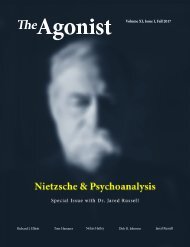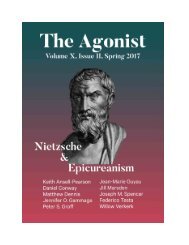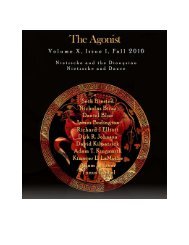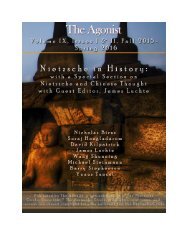Volume XII, Issue II, Spring 2019
You also want an ePaper? Increase the reach of your titles
YUMPU automatically turns print PDFs into web optimized ePapers that Google loves.
THE AGONIST<br />
There are cogent reasons to believe that Nietzsche’s ‘madness’ was not due<br />
to any exogenous agent nor to any intrinsic mental disorder but was a willed act on<br />
his part. Many indications in his history and writings suggest that this is what<br />
happened. In one of his earliest published books, Morgenröte (1881), written after<br />
resigning his professorship at Basel, the following passages can be found under<br />
the label Significance of madness in the history of morality:<br />
Nevertheless, when I say new and deviant ideas, values, desires again and again<br />
broke out, these occurred with a fearful accompaniment: almost everywhere it<br />
was madness that paved the way for the new ideas, that broke the spell of<br />
honored usage and superstition.<br />
Later in the same passage,<br />
Ach, so give me madness, you heavenly powers! Madness, so that I can finally<br />
believe in myself! Give delirium and convulsions, sudden lights and darkness,<br />
terrify me with frost and heat, as no mortal has ever felt, with roars and prowling<br />
forms, let me howl and whimper and creep like an animal; so only that I may<br />
find faith in myself! Doubt consumes me, I have killed the Law; the Law<br />
frightens me as a corpse does a living person: if I am not more than the Law, then<br />
I am the most depraved of all. (KSA 3:14)<br />
One wonders if this is a script for what followed seven years later in Nietzsche’s<br />
life.<br />
Nietzsche’s next book, Die Fröhliche Wissenschaft (1882), has a passage in the<br />
same vein but more depressing, in spite of the title of the book:<br />
Homo poeta—I myself, having made this tragedy of tragedies entirely on my own;<br />
I who have first tied up the knot of morality so tightly that only a God could<br />
loosen it—as Horace demanded!—I myself have murdered all the Gods in the<br />
fourth act—from Morality! What is now to become of the fifth? Where to get<br />
the tragic solution? Must I begin to think about a comic solution? (KSA 3:153)<br />
Podach (1931, 157) suggests that Nietzsche found this solution in a passage from<br />
Beyond Good and Evil:<br />
—In any case, with such a wish, it is necessary to be clear what one will get to<br />
see: only a satyr’s game, only a farcical epilogue, only the ongoing proof that the<br />
44









